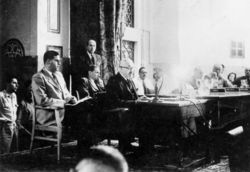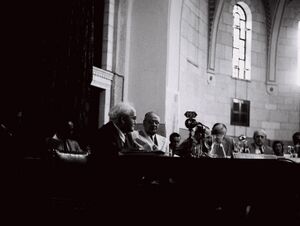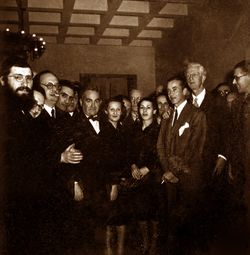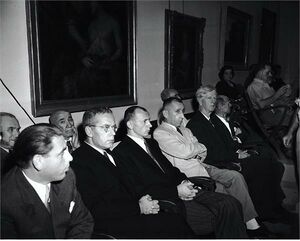لجنة الأمم المتحدة الخاصة بفلسطين

لجنة الأمم المتحدة الخاصة بفلسطين أو لجنة اليونسكوب اختصارا لـ UNISCOP، أنشأت في 15 مايو 1947 لدراسة المسألة الفلسطينية وطرح مقترحات لحل مشكلة فلسطين بعد انسحاب بريطانيا من فلسطين بناء على قرار الجمعية العامة الذي حمل رقم (106) وكانت تضم يوغوسلافيا وپيرو وإيران والهند وكندا والنمسا وگواتيمالا والسويد وأوروگواي، وتشيكوسلوفاكيا وهولندا. وقد أعطيت اللجنة حق اختيار الطريقة المناسبة لعملها، و قدمت تقريرها إلى الأمم المتحدة الذي طرح مشروعين، الأول تقسيم فلسطين إلى دولتين: عربية ويهودية، بينما ذهب المشروع الآخر إلى إنشاء دولة كونفدرالية تشمل كل فلسطين.
بريطانيا لم تكن سعيدة بالوضع السائد في فلسطين. وطلبت النصح من الأمم المتحدة في كيفية التصرف، في تصريح لوزير المستعمرات البريطاني كريتش جونز:
لم نأت للأمم المتحدة لتسليم الانتداب. بل أتينا للأمم المتحدة لنشرح لها المشاكل ولنطلب النصح منها في كيفية تصرف الانتداب. فإذا لم يكن الانتداب ممكناً بقاؤه بهذا الشكل، فإننا نود أن نسأل كيف يمكننا اصلاحه.
— وزير المستعمرات البريطاني كريتش جونز
The report of the committee dated 3 September 1947[1] supported the termination of the British Mandate in Palestine. It contained a majority proposal for a Plan of Partition into two independent states with Economic Union (CHAPTER VI) and a minority proposal for a Plan for one Federal union with Jerusalem as its capital (CHAPTER VII). The majority plan was supported by 8 of the 11 members, with Iran, India and Yugoslavia voting against. The Zionist side accepted the Plan of Partition while the Arab side rejected both proposals.
Following release of the report, the Ad Hoc Committee on the Palestinian Question was appointed by the General Assembly.
On 29 November 1947 the General Assembly adopted Resolution 181, based on the UNSCOP majority plan (with only slight modifications to the proposed recommendations).[2]
. . . . . . . . . . . . . . . . . . . . . . . . . . . . . . . . . . . . . . . . . . . . . . . . . . . . . . . . . . . . . . . . . . . . . . . . . . . . . . . . . . . . . . . . . . . . . . . . . . . . . . . . . . . . . . . . . . . . . . . . . . . . . . . . . . . . . . . . . . . . . . . . . . . . . . . . . . . . . . . . . . . . . . . .
التاريخ
On 15 May 1947, the General Assembly established the "United Nations Special Committee on Palestine" (UNSCOP). The Special Committee was given wide powers to ascertain and record facts, to investigate all questions and issues relevant to the problem of Palestine, and to make recommendations. It was authorized to conduct investigations in Palestine and wherever it might deem useful.[3]
It was decided that the committee should be composed of "neutral" countries, excluding the five permanent members of the Security Council, including the Mandatory power.[4] The committee's final composition was: Australia, Canada, Czechoslovakia, Guatemala, India, Iran, Netherlands, Peru, Sweden, Uruguay and Yugoslavia.[5]
عمل اللجنة
UNSCOP arrived in Palestine on 16 June 1947. While the Jewish Agency and the Jewish National Council cooperated with UNSCOP in its deliberations, the Arab Higher Committee charged UNSCOP with being pro-Zionist, and decided to boycott it. It announced a one-day general strike to protest its arrival, and Arab opposition figures were threatened with death if they spoke to UNSCOP. The Arab public was warned against making any contact whatsoever with UNSCOP and Arab journalists were prohibited from covering their visit. UNSCOP first heard evidence from two British representatives and the head of the Jewish Agency's Political Department, Moshe Shertok, who submitted documents and were questioned by the committee's members.[6]
From 18 June to 3 July, the committee visited Jerusalem, Haifa, the Dead Sea, Hebron, Beersheba, Gaza, Jaffa, the Galilee, Tel Aviv, Acre, Nablus, Bayt Dajan, Tulkarm, Rehovot, Arab and Jewish settlements in the Negev, and several Jewish agricultural settlements. When visiting Jewish areas, committee members were warmly welcomed, often with flowers and cheering crowds. When the committee visited Tel Aviv, a public holiday was declared.[7] The streets were decorated with flags and posters and crowds surrounded the delegates during their tour of the city. They met Tel Aviv mayor Israel Rokach, dining with him at a cafe and visiting city hall. During their visit to city hall, they were invited to step on to the balcony, at which point the crowd below sang Hatikvah. Jewish Agency officials also ensured that they met with Jews who spoke the native languages of committee members such as Swedish, Dutch, Spanish, and Persian. Committee members were given presentations arguing the Jewish case translated into their native languages. They were shown Jewish industry and commerce, agricultural innovations to allow farming in Jewish agricultural settlements in arid regions, and various institutions including Hadassah Medical Center, the Hebrew University of Jerusalem, and the laboratories of the Daniel Sieff Institute. During the committee's visit, it was accompanied by Jewish Agency officials acting as liaisons: Abba Eban, David Horowitz, and Moshe Tov.
By contrast, committee members were ignored and faced hostility in Arab areas. During UNSCOP visits to Arab areas, they were often met with empty streets, as well as locals who refused to answer their questions and even fled restaurants when they arrived. In one instance, when committee members visited a school in Beersheba, the pupils were instructed not to look at the visitors. During a visit to an Arab village in the Galilee, the entire population was evacuated except for children who remained behind and cursed at the visitors. UNSCOP members were deeply impressed by the cleanliness and modernity of Jewish areas, in comparison to the dirtiness and what they viewed as the backwardness of Arab areas. They were particularly horrified by the common sight of child labor and exploitation in Arab factories and workshops.[8]
UNSCOP officials clandestinely met with members of the high command of the Haganah, the main Jewish underground militia. The Haganah officials who attended the meeting, Yisrael Galili, Yigael Yadin, Yosef Avidar, and Ehud Avriel, insisted that the Haganah could repel any Arab attack, including by the surrounding Arab states.
UNSCOP also met twice with commanders from the right-wing Zionist guerrilla group Irgun after arranging contact with the Irgun through an Associated Press correspondent. In the first meeting, UNSCOP members met Irgun commander Menachem Begin along with Irgun high command members Haim Landau and Shmuel Katz, while in the second meeting they met with Begin and Irgun official Meir Cahan.[9]
It then held 12 public hearings from 4 to 17 July, during which 31 representatives from 12 Jewish organizations gave testimony and submitted written depositions, totaling thirty-two tons of material. Jewish Agency representatives such as David Ben-Gurion, Moshe Sharett, and Abba Eban testified, along with Chaim Weizmann, a former senior Zionist official who held no office at the particular time and testified as a private citizen. Zionist leaders argued for a Jewish state in Palestine and accepted the principle of partition. Anti-Zionist Jewish representatives from the Palestine Communist Party and Ichud party were included.[6][10][11][12] British officials also testified before the committee.
During the hearings, the Haganah's intelligence branch SHAI conducted an extensive operation to eavesdrop on committee members so as to ensure that Zionist leaders would be better prepared for the hearings. Microphones were placed in their hotels and conference rooms, their telephone conversations were tapped, and the cleaning staff of the building that the hearings took place was replaced with female SHAI agents who monitored them while posing as cleaning ladies. The intelligence gathered was then distributed among Jewish leaders, who were instructed to destroy the documents after reading them. This did not go unnoticed: a member of the Swedish delegation remarked that the cleaning staff of the building was "too pretty and educated. They are the eyes and ears of the Zionist leaders, who come to hearings with replies prepared in advance."[13]
Despite the official Arab boycott, several Arab officials and intellectuals privately met committee members to argue for a unitary Arab-majority state, among them AHC member and former Jerusalem mayor Husayn al-Khalidi.[10] The committee also received written arguments from Arab advocates.
The committee also met British officials. Some argued that the ideal solution would be to set up two autonomous Jewish and Arab states with Britain managing the finances of the two states due to the economic difficulties of partition and allowing Britain to retain a military presence in Palestine due to the growing threat from the Soviet Union. British military officials in particular emphasized the need for a continued British military presence in light of worsening relations between Britain and Egypt, arguing that bases in Palestine and continued control over Haifa harbor were essential for the defense of the Middle East. UNSCOP members were shown new British Army barracks being constructed in the Negev (which would never be completed), and were told that this would be the future basing area for British troops in the Suez Canal zone.[14]
The committee also noted the intense security and draconian laws in Palestine as a result of the ongoing Jewish insurgency conducted mainly by the Irgun and Lehi and to a lesser extent the Haganah. UNSCOP members noticed the constant presence of armed British security forces and armored cars in the streets, barbed wire around entire blocks of buildings, abundant pillboxes and roadblocks, and constant security checks in the streets. In addition, the Emergency Regulations imposed by the British, which allowed for detentions, confiscations, deportations, and trials before military rather than civil courts with no right to counsel, the admission of Henry Gurney, the Chief Secretary of Palestine, that the Palestine administration was spending nearly $30 million a year for police purposes, as well as the British insistence that their officials appear before UNSCOP hearings in private and a demand that they be informed in advance about who would be giving testimony, also left a negative impression.
Guatemalan delegate Jorge García Granados referred to the Palestine Mandate as a "police state." On June 16, the day of UNSCOP's first formal hearing, a British military court sentenced three Irgun fighters, Avshalom Haviv, Meir Nakar, and Yaakov Weiss, to death for their role in the Acre Prison break. UNSCOP appealed to the British government through UN Secretary-General Trygve Lie to spare their lives. The British refused, and were outraged at what they viewed as the committee's interference in the internal judicial affairs of the Mandate. Later, the Irgun captured two British sergeants and held them as hostages, threatening to kill them if the death sentences were carried out. Committee members discussed the sergeants when meeting with Begin, and refused an Irgun request to call Haviv, Nakar, and Weiss to testify before them over allegations of torture.[15]
UNSCOP also followed the events surrounding the SS Exodus, an illegal immigration ship carrying 4,554 Jewish Holocaust survivors which was intercepted by the Royal Navy. Some Committee members were present at the port of Haifa and witnessed British soldiers violently removing resisting passengers from the ship so they could be deported back to Europe. The committee completed its work in Palestine by hearing the eyewitness testimony of the Reverend John Stanley Grauel,[16] who was on the Exodus, convinced UNSCOP to reverse an earlier decision[which?]. The committee decided to hear the testimony of the Jewish refugees in British detention camps in Palestine and in European Displaced Persons camps trying to gain admittance to Palestine.[17]
Golda Meir, later Prime Minister of Israel, observed that Reverend Grauel's testimony and advocacy for the creation of the Jewish state fundamentally and positively changed the United Nations to support the creation of Israel.[18]
On July 21, the committee traveled to Lebanon, where they met with Lebanese Prime Minister Riad al-Solh and Foreign Minister Hamid Frangieh, who demanded an end to further Jewish immigration and the establishment of an Arab government in Palestine and claimed that the Zionists had territorial ambitions in Jordan, Syria, and Lebanon. On July 23, the representatives of Arab League states testified before the committee in Sofar. Frangieh told the committee that Jews "illegally" in Palestine would be expelled while the situation of those "legally" in Palestine but without Palestinian citizenship would be resolved by a future Arab government. Efforts by UNSCOP members to get other Arab diplomats to soften their stance failed, with one committee member noting that "there is nothing more extreme than meeting all the representatives of the Arab world in one group... when each one tries to show that he is more extreme than the other." Privately, the committee met with pro-Zionist Maronite Christian leaders, who told them that Lebanese Christians supported partition. Half of the committee's members then flew to Amman to meet with King Abdullah of Transjordan, who claimed that the Arabs would have "difficulty" accepting partition but refused to completely rule it out, hinting that in such an event, the Arab parts of Palestine should go to Transjordan.[10]
UNSCOP then flew to Geneva, and on August 8, a subcommittee began a week-long tour of displaced persons camps in American and British occupation zones in Germany and Austria, and interviewed Jewish refugees and local military officials. They found that there was a strong desire to immigrate to Palestine among the Jewish DPs.[10]
In Geneva, while writing the report, the committee was subject to Jewish, Arab, and British pressure. Zionist representatives vigorously lobbied the committee. They repeatedly submitted memoranda and recruited a Palestinian Arab representative whose father had been murdered by the Husseini clan that dominated the Palestinian Arab community to argue in favor of a Jewish-Transjordanian partition of the country before the committee. The Arab League liaison submitted a memorandum demanding a solution satisfactory to the Palestinian Arabs, threatening catastrophe would result otherwise. The British submitted a memorandum arguing partition was a feasible option.[10]
مداولات اللجنة المخصصة
The unanimous decision of the UNSCOP was for the termination of the mandate.
The Ad Hoc Committee on the Palestinian Question was appointed by the General Assembly, and two plans were drawn up for the Governance of Palestine on the termination of the Mandate. Seven members of the UNSCOP endorsed a partition plan (the Majority report) favoured by the Zionist leadership on 2 October 1947.
الأعضاء
- Australia
- John Hood, representative
- S. L. Atyeo, alternate
- Canada
- Justice Ivan Rand, representative
- Leon Mayrand, alternate
- Czechoslovakia
- Karel Lisicky, representative
- Richard Pech, alternate
- Guatemala
- Dr. Jorge García Granados, representative
- Lic.Emilio Zea Gonzalez, alternate and secretary
- India
- Sir Abdur Rahman, representative
- Venkata Viswanathan, alternate
- H. Dayal, second alternate
- إيران
- Nasrollah Entezam, representative
- Dr. Ali Ardalan, alternate
- Netherlands
- Dr. N. S. Blom, representative
- A. I. Spits, alternate
- Peru
- Dr. Alberto Ulloa, representative
- Dr. Arturo Garcia Salazar, alternate
- Sweden
- Justice Emil Sandström, representative
- Dr. Paul Mohn,
- Uruguay
- Professor Enrique Rodriguez Fabregat, representative
- Professor Óscar Secco Ellauri, alternate
- Edmundo Sisto, secretary
- Yugoslavia
- Vladimir Simic, representative
- Dr. Jože Brilej, alternate
الهامش
- ^ UNITED NATIONS: General Assembly: A/364: 3 September 1947: OFFICIAL RECORDS OF THE SECOND SESSION OF THE GENERAL ASSEMBLY: SUPPLEMENT No. 11: UNITED NATIONS SPECIAL COMMITTEE ON PALESTINE: REPORT TO THE GENERAL ASSEMBLYL VOLUME 1: Lake Success, New York 1947: Retrieved 9 May 2012 Archived 3 يونيو 2012 at the Wayback Machine
- ^ UNITED NATIONS: General Assembly: A/RES/181(II): 29 November 1947: Retrieved 10 May 2012 Archived 24 مايو 2012 at the Wayback Machine
- ^ ST/DPI/SER.A/47: Background Paper No. 47 Archived 2011-01-03 at the Wayback Machine, 20 April 1949]
- ^ It was urged that the special interests of the Great Powers meant that they would not be impartial and that their inclusion in the committee might result in political discussions which would delay its work, that the committee must not only be impartial but must also give the impression of being impartial. It was also felt that the United Kingdom as the Mandatory was an interested party and should not therefore sit on the committee."ST/DPI/SER.A/47 of 20 April 1949". Archived from the original on 2011-01-03. Retrieved 2007-07-31.
- ^ A/RES/106 (S-1)15 May 1947: Creation of the Committee: Retrieved 18 April 2012 Archived 6 أغسطس 2012 at the Wayback Machine
- ^ أ ب Report of UNSCOP - 1947
- ^ A State is Born in Palestine, New York Times
- ^ Morris, Benny (October 2008). 1948: A History of the First Arab-Israeli War. Yale University Press. ISBN 9780300145243.
- ^ Kumamoto, Robert D. (1999). International Terrorism & American Foreign Relations, 1945-1976. UPNE. ISBN 9781555533892.
- ^ أ ب ت ث ج Morris, Benny: 1948: A History of the First Arab-Israeli War
- ^ R. Judah Magnes Urges U.N. Committee to Recommend Bi-national State in Palestine
- ^ Munists Ask Independent Jewish-arab State in Testimony Before U.N. Probers
- ^ Bergman, Ronen (2011-10-07). "The Intelligence operation which led to the UN Decision to establish Israel, exactly 69 years ago- A New York Times Magazine Story". Ronen Bergman. Retrieved 2019-07-01.
- ^ Hollingworth, Clare (2015-07-24). The Arabs and the West. Routledge. ISBN 9781317414018.
- ^ Bell, Bowyer J. Terror out of Zion
- ^ http://www.palyam.org/Hahapala/Teur_haflagot/John_the_Priest.pdf[bare URL PDF]
- ^ The Birth of Israel The Drama as I Saw it, by Jorge Garcia Granados, Guatemalan Ambassador, Alfred Knopf, 1949
- ^ "There was great gratification for me in knowing that my eyewitness report was now a matter of record. Inherent in the nature of the relationship between Christians and Jews was the fact that because I was a Christian, in this situation my testimony would be given greater credence than that of a Jewish crew member." Elfenbein, Eleanor (June 1983). Grauel: An Autobiography as Told to Eleanor Elfenbein. Ivory House. ISBN 978-0960889600. pg.90
المصادر
. . . . . . . . . . . . . . . . . . . . . . . . . . . . . . . . . . . . . . . . . . . . . . . . . . . . . . . . . . . . . . . . . . . . . . . . . . . . . . . . . . . . . . . . . . . . . . . . . . . . . . . . . . . . . . . . . . . . . . . . . . . . . . . . . . . . . . . . . . . . . . . . . . . . . . . . . . . . . . . . . . . . . . . .
للاستزادة
- Ben-Dror, Elad (2015). Ralph Bunche and the Arab-Israeli Conflict: Mediation and the UN 1947–1949,Routledge. ISBN 978-1138789883.
- Ben-Dror, Elad (2022). UNSCOP and the Arab-Israeli Conflict: The Road to Partition. London: Routledge. ISBN 978-1032059631.
وصلات خارجية
- Records of the United Nations Special Committee on Palestine (UNSCOP) (1947) at the United Nations Archives
- Report of UNSCOP - 1947 and the ANNEXES, APPENDIX, MAPS of the Report
- Original documents can be found here and here
- Ivan Rand and the UNSCOP papers
- All articles with bare URLs for citations
- Articles with bare URLs for citations from March 2022
- Articles with PDF format bare URLs for citations
- Short description is different from Wikidata
- All articles with specifically marked weasel-worded phrases
- Articles with specifically marked weasel-worded phrases from January 2014
- تاريخ فلسطين
- الهيئات الفرعية للجمعية العامة للأمم المتحدة
- تأسيسات 1947
- الصراع الفلسطيني الإسرائيلي
- تاريخ إسرائيل




